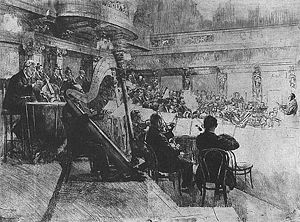Felix Weingartner Der Sturm (1921)
| FelixWeingartner (Photo credit: Wikipedia) |
I. Overture - 00:00
II. Intermezzo. Ferdinand und Miranda - 12:01
III. Scherzettino. Spuk neckender Geister - 16:29
IV. Finale. Prosperos Sieg - 20:22
Weingartner was born in Zara, Dalmatia, Austria--Hungary (now Zadar, Croatia), to Austrian parents, and the family moved to Graz in 1868. His father died that same year. He studied with Wilhelm Mayer (who used the pseudonym of W. A. Rémy and also taught Ferruccio Busoni) and in 1881 went to Leipzig to study philosophy, but soon devoted himself entirely to music, entering the Conservatory in 1883 and also studying under Franz Liszt in Weimar: he was among Liszt's later pupils. Liszt helped produce Weingartner's opera Sakuntala for its world premiere in 1884 with the Weimar orchestra. According to the Liszt biographer Alan Walker, the Weimar orchestra of the 1880s was far from its peak of a few decades earlier—and the opera performance ended with orchestra going one way and chorus another. Walker sources this to Weingartner's autobiography, published in Zürich and Leipzig in 1928-1929. The same year, 1884, he became the director of the Königsberg Opera. From 1885 to 1887 he was Kapellmeister in Danzig, then until 1889 in Hamburg,
and until 1891 in Mannheim. From 1891 he was Kapellmeister of the Royal Opera and conductor of symphony concerts in Berlin; he resigned from the Opera, though continuing to conduct the Symphony concerts, and settled in Munich, where he incurred the enmity of Rudolf Louis and Ludwig Thuille.
| English: Vienna Philharmonic Orchestra at the rehearsal (Felix von Weingartner conducting) (Photo credit: Wikipedia) |
As a conductor, Weingartner was the first to make commercial recordings of all nine Beethoven symphonies. In 1935 he conducted the world premiere of Georges Bizet's Symphony in C. His style of conducting was unlike those of many of his contemporaries; in contrast to Wilhelm Furtwängler, who conducted music in what is now considered a very "subjective" manner, with severe tempo fluctuations, Weingartner was more like Arturo Toscanini in insisting that his orchestras play the music as written. His 1935 recording of Beethoven's Symphony No. 9 sounds much more like Toscanini's later, 1952 recording than like any of Furtwängler's.












